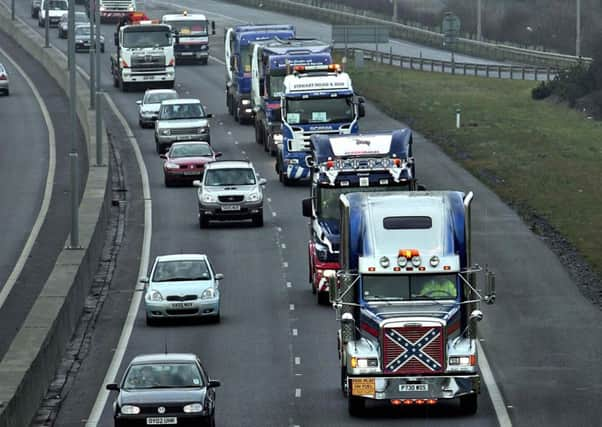Comment: Road haulage sector needs impetus not new regulations


Business as usual was confidently predicted in the run up to the EU referendum, with “Remain” expected to win by a short head – although not, it is fair to say, by some of my colleagues south of the Border.
In the immediate aftermath of the “Leave” vote, the UK has awaits a new prime minister and the emergence of a plan. Scotland will have to find out its options within that plan and which one it wants to choose. Minds are going to have to be sharp and well applied.
Advertisement
Hide AdAdvertisement
Hide AdIn road haulage and logistics, I see two dimensions at least, aside from the political. One is to do with what we would do with transport regulations if Scotland does end up coming out of the EU; the other is to do with giving new impetus to the industry, because whatever path we choose Scotland will need to focus on winning investment, and a good transport and logistics sector has a big contribution to make to that.
First of all, to regulations. Road haulage is governed, in the main, by rules that have come from Brussels. Everything from the weights, dimensions and emissions of lorries, vehicle safety requirements, the hours the industry can drive and work, the driver licencing, testing and qualification regime, what work foreign trucks can do here...The list seems endless.
Transport firms are asking, what will happen to all these rules and regulations? If Scotland remains in the EU or we have Brexit Light – something like the Norway model – the answer is very little if anything, including Customs controls on goods and the free movement of people. (Norway, unlike the UK, is even in the Schengen area).
A Hard Brexit, by contrast, could open up the prospect of a bonfire of the Brussels rules. Top of the list, so far as the haulage industry is concerned, is the road transport directive on working time (Directive 2002/15 EC). This has been cited by Brexit campaigner Priti Patel as Brussels at its worst and few hauliers would disagree.
Brussels already had detailed rules on lorry drivers’ hours (latest version 561/2006) which are well understood and accepted. The idea of a second set of rules on basically the same subject, with separate record keeping requirements, seems absurd.
But the industry would probably keep driving hours rules largely as they are – which while not perfect are understood and considered necessary. Boris Johnson ridiculed them in his first big Euro-sceptic speech, in 2004, but when we asked 70 people from the industry meeting in Coventry a couple of months ago if they would want a new set of rules if they could have them – what we called the “Boris option” – there were no takers.
Drivers themselves are more of a problem. There is structural problem with an ageing driver population and some of the RHA’s members, especially in England, are warning that we cannot afford to get to a position where Eastern Europeans are reluctant to come to the UK to work in the industry. Similarly, the last thing Scottish exports need is a set of new border controls or delays in getting goods to markets elsewhere in Britain and Europe.
Looking at how transport serves our broader economy, the jolt of the vote should set us thinking what we can do strengthen responsible innovation and efficiency within the industry. The industry does innovate, within the limits set by regulation.
Advertisement
Hide AdAdvertisement
Hide AdThe UK-wide trial of longer semi-trailers has demonstrated, for example, that an extra two metres of deck area on a semi-trailer (increased to 15.65 metres) can increas the competitiveness of UK industry, reduce prices to consumer, reduce emissions of carbon and other pollutants, all without any negative impact on road safety.
A Scottish company, Malcolm Group, has led the way in this, as the company operating the largest number of longer trailers. (It has also just won the UK industry’s top award, Motor Transport Haulier of the Year.) Four years into the trial, it is time to take the brakes off and allow more of these trailers, and to review how else large vehicles can help Scottish job and wealth creation.
• The Road Haulage Association and its members in Scotland will be highlighting the value the industry brings to the Scottish economy and the career opportunities it offers – in driving, warehousing, IT, management, finance and business development – during National Lorry Week, September 19th– 24th.